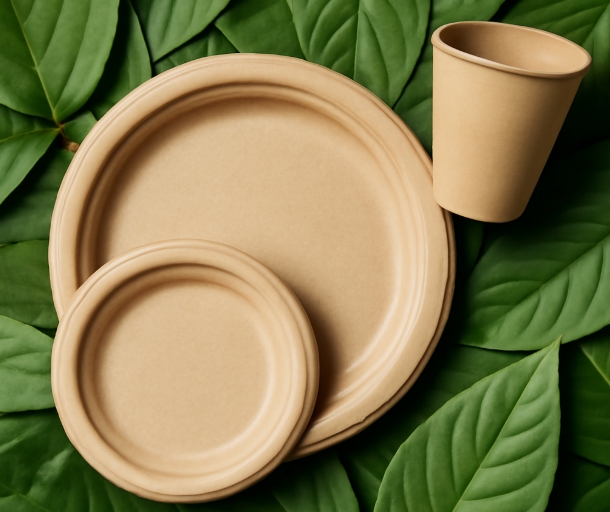
Content Menu
● Understanding Disposable Tableware
● The Environmental Impact of Disposable Tableware
>> Plastic Tableware: A Persistent Problem
>> Paper and Compostable Alternatives
>> Waste Management and Pollution
● Disposable Tableware Advantages Vendor: Why Businesses Choose Single-Use Solutions
>> Convenience and Efficiency
>> Hygiene and Safety
>> Cost-Effectiveness
>> Variety and Customization
● The Rise of Eco-Friendly Disposable Tableware
>> Plant-Based and Biodegradable Materials
>> Certifications and Standards
>> Supporting a Circular Economy
● Challenges and Limitations
>> Disposal Infrastructure
>> Cost and Accessibility
>> Consumer Awareness
● Disposable Tableware Advantages Vendor: The Role of Suppliers
● Making Informed Choices: What Should You Consider?
● The Future of Disposable Tableware
● Conclusion
● FAQ
>> 1. What are the main advantages of using disposable tableware for businesses?
>> 2. How do compostable and biodegradable disposable tableware differ from traditional plastic options?
>> 3. What should I look for when choosing a disposable tableware vendor?
>> 4. Can using disposable tableware actually save money for businesses?
>> 5. Are there any drawbacks to using eco-friendly disposable tableware?
Disposable tableware has become an integral part of modern life, especially in food service, catering, and fast-paced urban environments. With the rise of takeout culture and large-scale events, the demand for convenient, hygienic, and cost-effective dining solutions has soared. However, this growing reliance on disposable tableware has sparked a heated debate about its environmental impact. Is disposable tableware truly better for the environment, or does its convenience come at a hidden cost? This article explores the environmental implications, the advantages and disadvantages, the role of vendors, and the future of sustainable alternatives.

Understanding Disposable Tableware
Disposable tableware refers to single-use plates, cups, cutlery, bowls, and other items designed for one-time use before being discarded. These products are typically made from materials such as plastic, paper, foam, bamboo, or bagasse (sugarcane pulp). Vendors offer a wide variety of disposable tableware, catering to different needs and preferences, from budget-friendly plastic utensils to eco-friendly compostable plates.
The Environmental Impact of Disposable Tableware
Plastic Tableware: A Persistent Problem
Traditional disposable tableware, especially those made from plastic and foam, poses significant environmental challenges. The production process relies heavily on non-renewable resources and emits greenhouse gases, contributing to climate change. Once discarded, plastic tableware can take centuries to decompose, leading to overflowing landfills and widespread pollution in oceans and natural habitats. Microplastics released during degradation contaminate water and soil, threatening wildlife and human health.
Paper and Compostable Alternatives
Paper tableware, while often perceived as a greener option, still requires substantial resources for production and may be coated with plastic or wax for durability. Compostable tableware, on the other hand, is made from renewable plant-based materials like bamboo, bagasse, or cornstarch. These products break down much faster when composted properly, returning nutrients to the soil and reducing landfill waste. However, their environmental benefits are maximized only when disposed of in appropriate composting facilities.
Waste Management and Pollution
The sheer volume of waste generated by disposable tableware strains municipal waste management systems. Inadequate disposal often results in litter, blocked waterways, and harm to marine life. Even biodegradable and compostable options can end up in landfills, where the lack of oxygen slows decomposition and reduces their environmental advantage.
Disposable Tableware Advantages Vendor: Why Businesses Choose Single-Use Solutions
Convenience and Efficiency
One of the most compelling advantages of disposable tableware is convenience. Vendors highlight that these products eliminate the need for washing, drying, and storage, saving valuable time and labor for both households and businesses. This is especially beneficial for food service vendors during peak hours, allowing for faster customer turnover and efficient operations.
Hygiene and Safety
Disposable tableware offers a hygienic solution for serving food and beverages, as each item is used only once and comes sealed from the vendor. This minimizes the risk of cross-contamination and the spread of germs, a crucial factor in public health, especially during large gatherings or in healthcare settings.
Cost-Effectiveness
For many vendors and event organizers, disposable tableware presents a cost-effective alternative to traditional dishware. It reduces the need for investment in expensive crockery, dishwashing equipment, and utility expenses related to cleaning and maintenance. Bulk purchasing from disposable tableware advantages vendors can further lower costs and streamline supply chains.
Variety and Customization
Vendors now offer an extensive range of disposable tableware in various shapes, sizes, colors, and designs. This allows businesses to tailor their table settings to match the theme of an event or brand identity, enhancing the dining experience without sacrificing practicality.
The Rise of Eco-Friendly Disposable Tableware
Plant-Based and Biodegradable Materials
In response to environmental concerns, many vendors have shifted towards offering eco-friendly disposable tableware made from materials like bamboo, bagasse, cornstarch, and recycled paper. These products are designed to decompose quickly and safely, reducing the long-term impact on the environment.
Certifications and Standards
Eco-friendly disposable tableware often comes with certifications that verify its compostability, biodegradability, and food safety. Vendors that prioritize these standards not only appeal to environmentally conscious consumers but also ensure compliance with evolving regulations.
Supporting a Circular Economy
By choosing compostable or biodegradable disposable tableware, businesses and consumers contribute to a circular economy. This approach emphasizes the use of renewable resources and the return of organic matter to the soil, closing the loop and minimizing waste.
Challenges and Limitations
Disposal Infrastructure
The effectiveness of eco-friendly disposable tableware depends heavily on the availability of industrial composting facilities. In regions lacking such infrastructure, even compostable items may end up in landfills, where they decompose slowly and may not deliver the intended environmental benefits.
Cost and Accessibility
While prices are gradually decreasing, compostable and biodegradable options often remain more expensive than traditional plastic or paper products. This can be a barrier for small businesses or large-scale events with tight budgets.
Consumer Awareness
Proper disposal of eco-friendly disposable tableware requires consumer education. Vendors play a crucial role in informing customers about how to compost or recycle these products, ensuring that their environmental advantages are realized.

Disposable Tableware Advantages Vendor: The Role of Suppliers
Vendors are at the forefront of the shift towards sustainable tableware. By sourcing and supplying high-quality, certified compostable and biodegradable products, vendors empower businesses and consumers to make greener choices. Leading disposable tableware advantages vendors invest in research, innovation, and green manufacturing processes to reduce their environmental footprint while maintaining product durability and aesthetic appeal.
Vendors also provide guidance on selecting the right materials for specific applications, whether it's hot foods, cold beverages, or liquid-heavy dishes. Their expertise helps businesses balance sustainability goals with practical considerations like cost, performance, and customer satisfaction.
Making Informed Choices: What Should You Consider?
When deciding whether disposable tableware is better for the environment, it's essential to weigh several factors:
- Material Source: Opt for products made from renewable, plant-based materials.
- Certifications: Look for compostable, biodegradable, and food safety certifications.
- Vendor Reputation: Choose vendors committed to sustainability, quality, and transparency.
- Disposal Options: Ensure access to composting or recycling facilities.
- Cost vs. Impact: Balance budget constraints with environmental benefits.
The Future of Disposable Tableware
As environmental awareness grows, the disposable tableware industry is evolving rapidly. Vendors are innovating with new materials, improved manufacturing processes, and closed-loop systems that minimize waste. Government regulations and consumer demand are driving the adoption of sustainable alternatives, making eco-friendly disposable tableware more accessible and affordable.
Businesses that partner with reputable disposable tableware advantages vendors can enhance their sustainability image, meet regulatory requirements, and appeal to eco-conscious customers. The transition to greener solutions is not without challenges, but with collective effort from vendors, businesses, and consumers, disposable tableware can become part of a more sustainable future.
Conclusion
Disposable tableware offers undeniable advantages in terms of convenience, hygiene, and cost-effectiveness, making it a popular choice for vendors, businesses, and consumers alike. However, traditional plastic and foam options have significant environmental drawbacks, contributing to pollution, waste, and resource depletion.
The emergence of eco-friendly disposable tableware-made from renewable, biodegradable, and compostable materials-presents a promising solution. When sourced from responsible vendors and disposed of correctly, these products can significantly reduce environmental impact. The key to maximizing their benefits lies in choosing certified products, supporting reputable vendors, and ensuring proper disposal through composting or recycling.
Ultimately, whether disposable tableware is better for the environment depends on the materials used, the practices of vendors, and the actions of consumers. By making informed choices and embracing sustainable alternatives, we can enjoy the advantages of disposable tableware while minimizing harm to our planet.

FAQ
1. What are the main advantages of using disposable tableware for businesses?
Disposable tableware offers businesses convenience, efficiency, and cost savings. It eliminates the need for washing and storage, reduces labor costs, and ensures a hygienic dining experience for customers. Vendors provide a wide variety of options to suit different needs, from budget-friendly to premium eco-friendly products.
2. How do compostable and biodegradable disposable tableware differ from traditional plastic options?
Compostable and biodegradable tableware are made from renewable materials like bamboo, bagasse, or cornstarch. They break down naturally and safely in composting environments, reducing landfill waste and pollution. Traditional plastic options, on the other hand, are made from fossil fuels and can take centuries to decompose, posing long-term environmental risks.
3. What should I look for when choosing a disposable tableware vendor?
Look for vendors that offer certified compostable or biodegradable products, prioritize sustainability in their sourcing and manufacturing, and provide clear information about proper disposal. Reputable vendors also offer a range of designs and materials to match your specific needs and sustainability goals.
4. Can using disposable tableware actually save money for businesses?
Yes, disposable tableware can reduce costs associated with purchasing, maintaining, and cleaning traditional dishware. Bulk purchasing from vendors often results in further savings. Additionally, it saves on water and energy expenses, especially for businesses with high customer turnover.
5. Are there any drawbacks to using eco-friendly disposable tableware?
The main drawbacks include higher upfront costs compared to traditional plastic options and the need for proper composting or recycling facilities. In areas without adequate infrastructure, even compostable products may end up in landfills, limiting their environmental benefits. Consumer education and vendor support are crucial to overcoming these challenges.

















